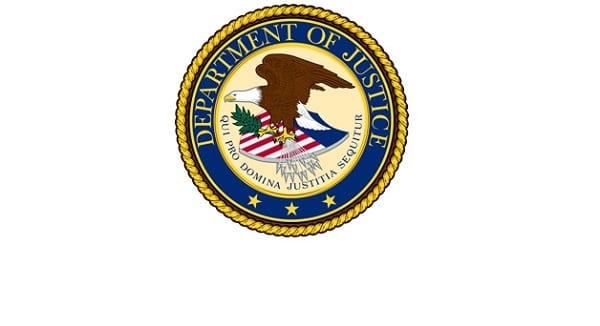BALTIMORE, MD—U.S. Attorney Robert K. Hur on Monday announced a series of grants that would be awarded to various Maryland institutions.
Over $2.9 million in Department of Justice grants will help fight drug abuse and addiction in Maryland, over $622,000 will be awarded to the Maryland Office of the Public Defender to support juvenile justice initiatives to reduce crime and recidivism associated with mental illness and co-occurring disorders, and $10,199,380 in DOJ grants will go to benefit law enforcement officers in the state.
Addiction Crisis
“The addiction crisis has taken an enormous toll on America’s families and communities, eroding public health, threatening public safety and claiming tens of thousands of lives year after year,” said Attorney General William P. Barr. “Through comprehensive measures taken by this administration, we have been able to curtail the opioid epidemic, but new and powerful drugs are presenting exceptional challenges that we must be prepared to meet. The Justice Department’s substantial investments in enforcement, response, and treatment will help us overcome these challenges and work towards freeing Americans from abuse and addiction.”
“We must do everything we can to combat opioid addiction,” said U.S. Attorney Robert K. Hur. “These grants from the Department of Justice will help prevent opioid addiction through prescription drug monitoring programs, provide treatment to drug-addicted prisoners, and help prosecute drug dealers by enhancing our ability to evaluate evidence. These efforts are crucial to the fight to stop drug abuse and dangerous overdoses.”
“If we hope to defeat an enemy as powerful, persistent and adaptable as illicit drugs, we must be at least as determined and versatile, focusing our ingenuity and resources on curbing abuse and fighting addiction,” said DOJ Office of Justice Programs’ Principal Deputy Assistant Attorney General Katharine T. Sullivan. “These grants will enable criminal justice officials and substance abuse, mental health and other medical professionals to pool their assets and bring the full weight of our public safety and treatment systems down on this epidemic that has already caused so much harm.”
The following organizations received funding:
- The Maryland Department of Health has received $1,930,382 to enhance the capacity of regulatory and law enforcement agencies and public health officials to collect and analyze controlled substance prescription data and other scheduled chemical products through a centralized database. Prescription drug monitoring programs help state and local governments to detect and prevent the diversion and abuse of pharmaceutically controlled substances such as opioids and other prescription drugs.
- The Governor’s Office of Crime Prevention, Youth, and Victim Services has received $427,047 for residential substance abuse for state prisoners.
- The National Institute of Standards and Technology is receiving a total of $548,200 for research and development in forensic science for criminal justice purposes; and for research and evaluation for the testing and interpretation of physical evidence in publicly funded forensic labs.
Mental Health Programs for Juveniles
“These grant funds will assist youth offenders with mental illness or co-occurring mental health and substance abuse disorders,” said Hur. “Hopefully, linking these juveniles with treatment will prevent them from re-offending.”
“More and more people with mental illness are coming into contact with the criminal justice system, straining law enforcement resources and placing exceptional demands on our jails and prisons,” said Sullivan. “By supporting partnerships between justice system professionals and treatment providers, we are making substantial investments in addressing the link between mental health and public safety.”
The following organization in Maryland received funding:
- The Maryland Office of the Public Defender will receive $622,883 from the Juvenile Justice and Mental Health Collaboration Program.
Law Enforcement Officer Safety
“We simply cannot close our eyes to the unique risks facing law enforcement officers,” said Hur. “It is critically important to support our law enforcement officers and these grants will help provide the tools needed to keep them safe and healthy.”
“The Office of Justice Programs stands proudly with the Attorney General and the President in our commitment to the health and safety of 700,000 sworn law enforcement professionals who selflessly place their lives in jeopardy to keep us all safe,” said Sullivan. “Bulletproof vests, body-worn cameras, professional training on wellness and safety—these resources, equipment and strategies will help officers do their jobs effectively, keep them safe from harm and protect their health.”
Nationwide, more than $19 million will support the training and implementation of law enforcement agencies’ body-worn camera programs. Another $23.6 million will reimburse jurisdictions for up to 50 percent of the cost of body-armor vests, while nearly $11 million will support law enforcement safety and wellness programs, research and services.
The following organizations in Maryland received funding:
- Morgan State University received $139, 380 under the Body-Worn Camera Policy and Implementation Program to enable it to improve the capacity to gather evidence and protect the safety of law enforcement officers and citizens.
- Towson University received $60,000 under the same program.
- Justice and Security Strategies received $10 million under the Supporting Small and Rural Agency Body-Worn Camera Policy and Implementation Program to provide funding and program development to assist small agencies nationwide.
Do you value local journalism? Support NottinghamMD.com today.

